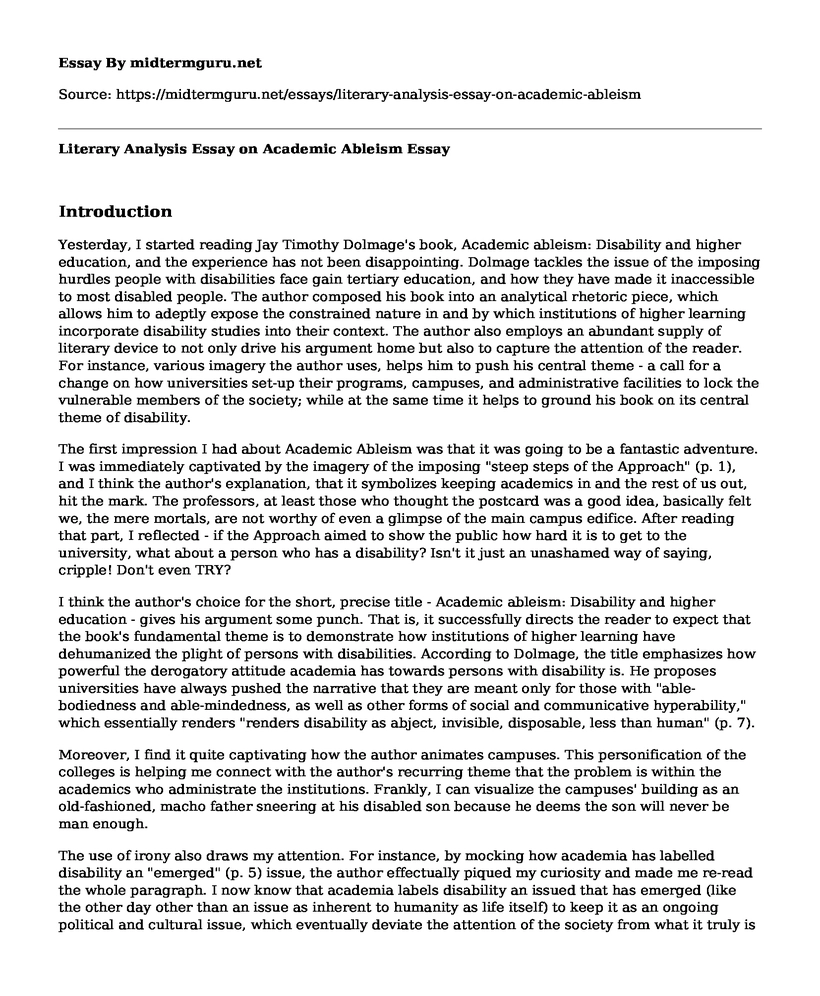Introduction
Yesterday, I started reading Jay Timothy Dolmage's book, Academic ableism: Disability and higher education, and the experience has not been disappointing. Dolmage tackles the issue of the imposing hurdles people with disabilities face gain tertiary education, and how they have made it inaccessible to most disabled people. The author composed his book into an analytical rhetoric piece, which allows him to adeptly expose the constrained nature in and by which institutions of higher learning incorporate disability studies into their context. The author also employs an abundant supply of literary device to not only drive his argument home but also to capture the attention of the reader. For instance, various imagery the author uses, helps him to push his central theme - a call for a change on how universities set-up their programs, campuses, and administrative facilities to lock the vulnerable members of the society; while at the same time it helps to ground his book on its central theme of disability.
The first impression I had about Academic Ableism was that it was going to be a fantastic adventure. I was immediately captivated by the imagery of the imposing "steep steps of the Approach" (p. 1), and I think the author's explanation, that it symbolizes keeping academics in and the rest of us out, hit the mark. The professors, at least those who thought the postcard was a good idea, basically felt we, the mere mortals, are not worthy of even a glimpse of the main campus edifice. After reading that part, I reflected - if the Approach aimed to show the public how hard it is to get to the university, what about a person who has a disability? Isn't it just an unashamed way of saying, cripple! Don't even TRY?
I think the author's choice for the short, precise title - Academic ableism: Disability and higher education - gives his argument some punch. That is, it successfully directs the reader to expect that the book's fundamental theme is to demonstrate how institutions of higher learning have dehumanized the plight of persons with disabilities. According to Dolmage, the title emphasizes how powerful the derogatory attitude academia has towards persons with disability is. He proposes universities have always pushed the narrative that they are meant only for those with "able-bodiedness and able-mindedness, as well as other forms of social and communicative hyperability," which essentially renders "renders disability as abject, invisible, disposable, less than human" (p. 7).
Moreover, I find it quite captivating how the author animates campuses. This personification of the colleges is helping me connect with the author's recurring theme that the problem is within the academics who administrate the institutions. Frankly, I can visualize the campuses' building as an old-fashioned, macho father sneering at his disabled son because he deems the son will never be man enough.
The use of irony also draws my attention. For instance, by mocking how academia has labelled disability an "emerged" (p. 5) issue, the author effectually piqued my curiosity and made me re-read the whole paragraph. I now know that academia labels disability an issued that has emerged (like the other day other than an issue as inherent to humanity as life itself) to keep it as an ongoing political and cultural issue, which eventually deviate the attention of the society from what it truly is - a medical condition.
More importantly, I have always been a weak reader of highly technical writings that are overcrowded with citations and statistics. However, Dolmage, although he overuses scholarly quotations, he often introduces, or explains them, with a pinch of irony or humor, which kept me turning pages. Also, his borrowed direct quotes are short, simple, and enjoyable. For instance, I think his tone is sort of sarcastic when he claims, "I offer this tangle of citations, this stack of numbers not as decisive facts-the numbers shift" (p. 26) and others could misuse then by presenting them in misleading studies. I appreciate this comment as it drives the message that readers should always remain objective when reading other people's works, perhaps even Academic Ableism, to avoid being misinformation. In short, by integrating other scholars writing to his book, the author manages to give credibility to his assertions.
Overall, I think Dolmage proficiently introduces the scope of his book by using an exciting style of language, which keeps the reader captivated. He uses efficient literary devices, such as imagery, irony, and humor to not only create mental pictures of what he is driving at, but also to inspire the reader to interrogate his claims while reading and, when necessary alleviate the reader's pain over a topic that is quite disturbing to read. Frankly, though, I loved how he twisted Michel Foucault's quote to put his thesis into an intelligible summary. He argues: "Likewise, it is worth remembering that at the contemporary college or university, ableism is everywhere: not that it overwhelms all of the good schooling can do, not that it invalidates your teaching or your research, but that we are all responsible for looking for it, recognizing our roles in its circulation, and seeking change" (p. 31).
Reference
Dolmage, J. T. (2017). Academic ableism: Disability and higher education. University of Michigan Press.
Cite this page
Literary Analysis Essay on Academic Ableism. (2023, Jan 31). Retrieved from https://midtermguru.com/essays/literary-analysis-essay-on-academic-ableism
If you are the original author of this essay and no longer wish to have it published on the midtermguru.com website, please click below to request its removal:
- Observation on the Level of Communication Between Parents and Children
- Essay on Predicting Hospital Readmission Risk
- Patient Summary: Developed Subtalar Arthritis - Nursing Paper Example
- The Theme of Duty in William Shakespeares Hamlet - Literature Essay Sample
- Literary Analysis Essay on Flight by Sherman Alexi
- Essay Sample on Education and Living A Healthier Lifestyle
- Decreasing the Consumption of Foods With Sugar Increases Their Reinforcing Value - Article Analysis Essay







